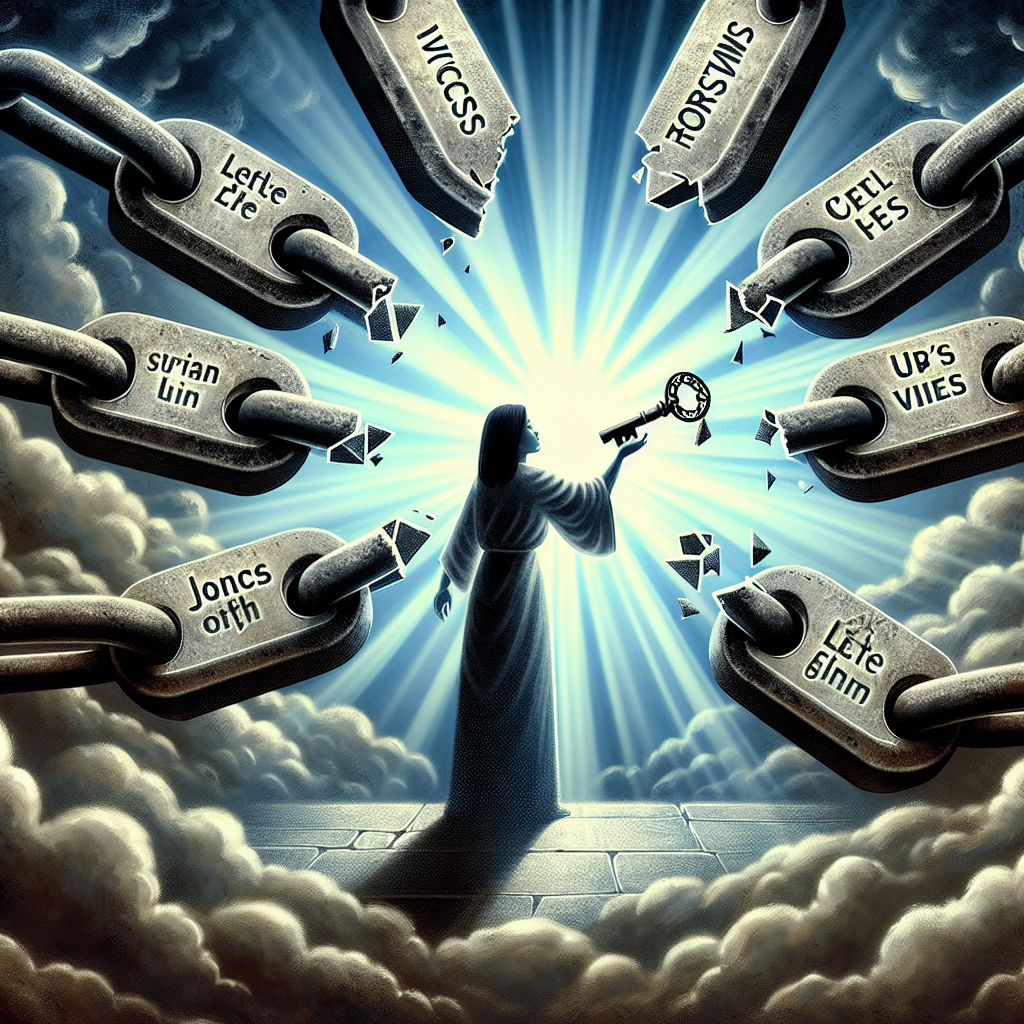-
Table of Contents

“Forgiveness: The Key to Unlocking True Recovery from Addiction”
Introduction
The Role of Forgiveness in Healing from Addiction
Forgiveness plays a pivotal role in the journey of healing from addiction, serving as a cornerstone for emotional and psychological recovery. Addiction often leaves a trail of broken relationships, guilt, and self-loathing, which can impede the recovery process. Embracing forgiveness, both towards oneself and others, can alleviate these burdens, fostering a sense of inner peace and self-acceptance. By letting go of past grievances and self-blame, individuals can break free from the cycle of negative emotions that fuel addictive behaviors. This transformative process not only aids in emotional healing but also strengthens resilience, enabling individuals to rebuild their lives and maintain long-term sobriety. Through forgiveness, the path to recovery becomes a journey of self-discovery, compassion, and renewed hope.
The Power of Forgiveness in Overcoming Addiction: A Path to Recovery
Forgiveness is a powerful and transformative force, particularly in the context of overcoming addiction. For many individuals struggling with addiction, the journey to recovery is fraught with emotional and psychological challenges. Among these, feelings of guilt, shame, and self-blame often loom large, creating barriers to healing and personal growth. However, embracing forgiveness—both of oneself and others—can play a crucial role in breaking free from the chains of addiction and fostering a path to recovery.
One of the first steps in the process of forgiveness is self-forgiveness. Addiction often leads individuals to engage in behaviors that are harmful to themselves and others, resulting in deep-seated feelings of remorse and regret. These negative emotions can perpetuate a cycle of self-destructive behavior, making it difficult to move forward. By practicing self-forgiveness, individuals can begin to release the burden of their past actions and create space for healing. This does not mean excusing or justifying harmful behavior, but rather acknowledging one’s mistakes, taking responsibility, and committing to positive change.
In addition to self-forgiveness, forgiving others is equally important in the recovery process. Many individuals with addiction have experienced trauma, betrayal, or hurt at the hands of others, which can contribute to their substance use as a coping mechanism. Holding onto resentment and anger can hinder emotional healing and perpetuate a sense of victimhood. By choosing to forgive those who have caused pain, individuals can reclaim their power and focus on their own growth and well-being. This act of forgiveness can be incredibly liberating, allowing individuals to let go of the past and move forward with a renewed sense of purpose.
Moreover, forgiveness can strengthen relationships and support systems, which are vital components of recovery. Addiction often strains or severs connections with loved ones, leading to isolation and loneliness. By seeking and granting forgiveness, individuals can rebuild trust and repair damaged relationships. This process fosters a supportive environment where individuals feel understood and valued, which is essential for sustained recovery. The sense of belonging and connection that comes from mended relationships can provide the encouragement and motivation needed to stay on the path to sobriety.
Furthermore, forgiveness can enhance one’s overall mental and emotional well-being. Research has shown that holding onto grudges and harboring resentment can have detrimental effects on mental health, contributing to anxiety, depression, and stress. Conversely, practicing forgiveness has been linked to improved psychological health, including reduced stress levels, increased feelings of empathy and compassion, and greater overall life satisfaction. For individuals in recovery, these positive mental health outcomes can be instrumental in maintaining sobriety and building a fulfilling life.
In conclusion, the power of forgiveness in overcoming addiction cannot be overstated. By embracing self-forgiveness, forgiving others, and fostering supportive relationships, individuals can break free from the cycle of guilt and resentment that often accompanies addiction. This transformative process not only aids in emotional and psychological healing but also paves the way for a more hopeful and empowered future. As individuals navigate the challenging journey of recovery, forgiveness can serve as a beacon of light, guiding them toward a life of sobriety, peace, and fulfillment.
How Forgiveness Facilitates Emotional Healing in Addiction Recovery
Forgiveness plays a pivotal role in the emotional healing process for individuals recovering from addiction. The journey to sobriety is often fraught with emotional turmoil, guilt, and shame, which can be significant barriers to recovery. By embracing forgiveness, both self-forgiveness and forgiveness of others, individuals can unlock a powerful tool that aids in emotional healing and paves the way for lasting recovery.
One of the first steps in the recovery process is acknowledging the harm caused by addiction, not only to oneself but also to others. This acknowledgment can be incredibly painful, as it often brings to light the extent of the damage inflicted on relationships, careers, and personal well-being. However, it is a necessary step that sets the stage for forgiveness. By facing these truths, individuals can begin to understand the importance of letting go of past mistakes and moving forward.
Self-forgiveness is a crucial component of this process. Many individuals struggling with addiction harbor deep-seated feelings of guilt and self-loathing. These negative emotions can create a vicious cycle, where the individual feels unworthy of recovery and thus continues to engage in destructive behaviors. By practicing self-forgiveness, individuals can break this cycle. It involves recognizing that everyone makes mistakes and that these mistakes do not define one’s worth. Through self-compassion and understanding, individuals can begin to rebuild their self-esteem and develop a more positive self-image.
In addition to self-forgiveness, forgiving others is equally important. Addiction often leads to strained relationships, and holding onto resentment and anger can hinder the healing process. Forgiving those who may have contributed to one’s addiction or who have hurt them in other ways allows individuals to release the emotional burden that these negative feelings carry. This release can lead to a sense of peace and emotional freedom, which are essential for recovery. It is important to note that forgiveness does not mean condoning harmful behavior or forgetting the past; rather, it is about freeing oneself from the grip of negative emotions that can impede progress.
Moreover, forgiveness fosters a sense of empathy and understanding, which can be transformative in the recovery journey. By forgiving themselves and others, individuals can develop a deeper sense of compassion. This compassion can extend to others who are also struggling with addiction, creating a supportive and empathetic community. Such a community can provide the encouragement and understanding needed to navigate the challenges of recovery.
Furthermore, forgiveness can lead to improved mental health. Studies have shown that individuals who practice forgiveness experience lower levels of anxiety, depression, and stress. These mental health benefits are particularly important for those in recovery, as they can reduce the risk of relapse. By alleviating the emotional burdens associated with addiction, forgiveness can create a more stable and positive mental state, which is conducive to long-term sobriety.
In conclusion, forgiveness is a powerful and transformative tool in the emotional healing process for individuals recovering from addiction. By embracing self-forgiveness and forgiving others, individuals can release the negative emotions that hinder their progress, develop a sense of empathy and compassion, and improve their mental health. This emotional healing is essential for achieving lasting recovery and building a fulfilling, sober life. Through forgiveness, individuals can find the strength and resilience needed to overcome addiction and move forward with hope and optimism.
Q&A
1. **Question:** How does forgiveness contribute to the emotional healing process in addiction recovery?
**Answer:** Forgiveness helps individuals release feelings of guilt, shame, and resentment, which can be significant emotional barriers in addiction recovery. By forgiving themselves and others, individuals can reduce emotional stress and create a more positive mindset conducive to healing and personal growth.
2. **Question:** What role does self-forgiveness play in preventing relapse in addiction recovery?
**Answer:** Self-forgiveness allows individuals to move past their mistakes and setbacks without being overwhelmed by negative emotions. This can reduce the likelihood of relapse by fostering a sense of self-compassion and resilience, which are crucial for maintaining long-term sobriety.
Conclusion
Forgiveness plays a crucial role in healing from addiction by allowing individuals to release feelings of guilt, shame, and resentment that often accompany substance abuse. It fosters emotional and psychological healing, enabling individuals to rebuild self-esteem and relationships. By forgiving themselves and others, individuals can break free from the cycle of negative emotions that fuel addictive behaviors, paving the way for recovery and personal growth.



